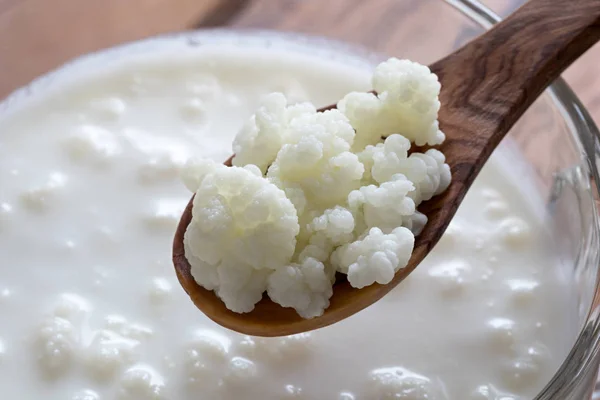Kefir (pronounced kee-feer) is a fermented beverage traditionally made from cow, goat, or sheep milk. Believed to have originated in the Caucasus Mountains of Eastern Europe centuries ago. It’s created by introducing “kefir grains,” a gelatinous complex of bacteria and yeast, to milk and allowing it to ferment. This process results in a slightly fizzy, tangy drink similar in consistency to drinkable yogurt.
Kefir has gained popularity in recent years due to its potential health benefits, largely attributed to its rich probiotic content. Probiotics are live bacteria that offer various advantages for gut health, digestion, and immune function. Studies suggest kefir may also contribute to optimal health function and well-being.

Health Benefits Of Kefir
Controls Blood Sugar Levels: Kefir has been shown to help control blood sugar levels, which is beneficial for individuals with diabetes or those at risk of developing the condition. The probiotics in kefir may improve insulin sensitivity and reduce inflammation, leading to better blood sugar regulation.
- Lowers Cholesterol: Regular consumption of kefir has been linked to lower cholesterol levels. The probiotics and bioactive compounds in kefir can help reduce LDL (bad) cholesterol while increasing HDL (good) cholesterol, promoting heart health.
- May Help Treat Gastrointestinal Diseases: Kefir is known for its positive effects on gut health. The probiotics in kefir can help treat various gastrointestinal issues such as irritable bowel syndrome (IBS), inflammatory bowel disease (IBD), and diarrhea by restoring the balance of beneficial bacteria in the gut.
- Improves Heart Health: The combination of probiotics, bioactive peptides, and calcium in kefir can contribute to improved heart health. Regular consumption may help lower blood pressure, reduce inflammation, and prevent heart disease.
- Awesome For Gut Health: One of the most well-known benefits of kefir is its ability to improve gut health. The probiotics in kefir support a healthy balance of gut bacteria, which is essential for digestion, nutrient absorption, and overall immune function.
- Promotes Immune Function: The probiotics found in kefir play a crucial role in supporting immune function. By maintaining a healthy balance of gut bacteria, kefir can enhance the body’s immune response and help protect against infections and illnesses.
- Supports Bone Health: Kefir is a good source of calcium, which is essential for maintaining strong and healthy bones. Regular consumption of kefir can help prevent osteoporosis and improve bone density, especially important for postmenopausal women.
- Regulates Blood Pressure: The bioactive peptides in kefir have been associated with blood pressure regulation. Including kefir in your diet may help lower high blood pressure and reduce the risk of cardiovascular problems.
- Encourages Mental Well-Being: The gut-brain connection is well-established, and the probiotics in kefir can positively impact mental health. Consuming kefir may help reduce symptoms of anxiety and depression by promoting a healthy gut microbiome. Incorporating kefir into your daily diet can be a delicious way to reap these numerous health benefits and support your overall well-being.
What Are The Different Types Of Kefir?
There are two main types of kefir: milk kefir and water kefir, each offering unique characteristics and benefits:
Milk Kefir
Description: Milk kefir is a fermented beverage traditionally made from cow’s milk but can also be produced from other milks like goat, almond, or coconut milk.
Appearance: It resembles runny yogurt with a creamy texture and tart taste.
Production: Made using kefir grains, which are a symbiotic culture of beneficial bacteria and yeast.
Health Benefits: Rich in probiotics, calcium, potassium, vitamins A and B, and magnesium. Supports digestion, immune system, bone health, skin health, cardiovascular health, and may reduce the risk of chronic diseases.
Suitability: Can be consumed by individuals of all ages. Suitable for those lactose intolerant as the bacteria in kefir feed on lactose, reducing its content.
Water Kefir
Description: Water kefir is a non-dairy alternative made with fruit juices, coconut water, or sugar water.
Production: Fermented with a culture that feeds on sugars to create probiotics and unlock vitamins and minerals.
Health Benefits: Contains probiotics and is a good replacement for store-bought sodas. Offers a bubbly drink with naturally occurring carbonation.
Variety: Lighter than milk kefir, making it easier to consume in larger quantities for hydration.
Differences: Water kefir is dairy-free, making it suitable for vegans or those avoiding dairy. It has a yellowish crystal appearance compared to the creamy white appearance of milk kefir.
Both types of kefir are nutritious and offer various health benefits. Milk kefir is rich in nutrients like calcium and probiotics beneficial for gut health and bone strength. On the other hand, water kefir provides a refreshing non-dairy option with probiotics and natural carbonation. Choosing between the two depends on personal preferences and dietary requirements.
How to Make kefir At Home
To make milk kefir at home, you will need:
Ingredients:
- 2 teaspoons kefir grains
- 3 cups fresh milk (cow or goat milk)
- Plastic lid
Equipment:
- Glass jar
- Plastic lid
- Plastic or wooden spoon
- Non-metal strainer
- Paper towels or coffee filters
- Rubber band
Instructions:
- Clean the jar, lid, and spoon with regular soap to remove any residue.
- Add 2 teaspoons of kefir grains to a clean glass jar.
- Pour 3 cups of fresh milk into the jar, leaving about 1 inch of space at the top.
- Cover the jar with a plastic lid, but do not tighten it.
- Place the jar in a warm, dark place (65 to 85°F / 18 to 29°C) for about 24 hours.
- The kefir is ready when it has slightly thickened and smells fermented.
- Strain the kefir grains using a non-metal strainer, and store the finished kefir in the refrigerator for up to two weeks.
Remember to avoid using metal utensils when dealing with kefir grains, as they can react with the acidity of the ferment and damage the grains.
How Much Kefir Is Enough To Drink?
The amount of kefir you should drink depends on your individual needs and tolerance. For milk kefir, a common starting point is about 1 cup per day, which can be increased to around 2 cups per day if you feel comfortable with the amount.
For water kefir, the amount is typically less, with 1/2 cup to 2 cups per day being a common range.
It’s essential to listen to your body and adjust the amount based on your comfort level. If you experience any adverse side effects, such as digestive issues, you may need to reduce your intake or discontinue consumption.
Don’t Miss | Can Snoring Increase Stroke Risk In Adults? Here’s What Experts Want You To Know
Resources
- https://www.healthline.com/nutrition/dangers-of-kefir
- https://www.everydayhealth.com/diet-nutrition/diet/kefir-types-nutrition-facts-health-benefits-recipe/
- https://www.ncbi.nlm.nih.gov/pmc/articles/PMC7938729/
- https://www.ncbi.nlm.nih.gov/pmc/articles/PMC10311804/
- https://www.ncbi.nlm.nih.gov/pmc/articles/PMC4675497/7
- https://www.mdpi.com/2072-6643/12/11/3432
- https://www.frontiersin.org/articles/10.3389/fnut.2020.578702









